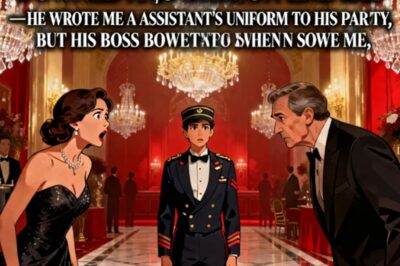
I. “A Song You Will Never Forget”
The annual gala for the “Opportunities for Youth” foundation was the glittering, suffocating apex of the Los Angeles charity season. Mrs. Eleanor Davenport, the city’s reigning philanthropist and a woman whose generosity was matched only by her ruthlessness, moved through the opulent ballroom of the Beverly Wilshire Hotel in a cloud of bespoke silk and heirloom diamonds. Her smile was as bright and hard as the spotlights that followed her every move. The air was thick with the scent of expensive perfume, the clinking of champagne flutes, and the low, self-congratulatory hum of the city’s elite.
The polite, orchestrated murmur was shattered by a commotion at the grand entrance. A child, no older than twelve, had somehow slipped past the velvet ropes and the phalanx of imposing security guards. She was a stark, grimy contrast to the curated, Botoxed perfection of the event. Her oversized hoodie was torn at the elbow, her face was smudged with a dirt that looked days old, and her sneakers were held together with peeling strips of duct tape. She was clearly starving, her small frame thin and fragile, but her eyes held a fire that was hotter and more dangerous than simple hunger. It was the fire of a singular, desperate purpose.
Mrs. Davenport, whose perfectly managed events were her personal kingdom, was the first to intercept her. Her perfect hostess smile froze into a mask of cold, undisguised disdain. “You do not belong here, child,” she said, her voice low and sharp, yet carrying with the chilling clarity of a dropped icicle in the sudden, expectant silence. She signaled for security with a subtle, dismissive flick of her wrist. “This is a private fundraiser, not a public shelter. You are trespassing.”
A ripple of cruel, amused laughter went through the nearby guests. They looked at the girl as if she were a particularly distasteful piece of performance art. As the two large security guards moved in, their expressions grim and impatient, the girl did not cower. She did not run. She lifted her chin, her small, defiant face illuminated by the grand chandelier, and stared directly into the eyes of the most powerful woman in the room.
“I’m here to play the piano,” the girl announced, her voice surprisingly clear and steady, ringing out over the whispers. “I’m going to play a song. A song I promise you will never, ever forget.”
II. “An Opportunity for Youth”
“Remove her,” Mrs. Davenport commanded, her voice now clipped and hard, her patience gone. This was an embarrassment, a stain on her perfect evening. The guards grabbed the girl’s thin arms, their large hands easily encircling her biceps.
“Wait.”
The voice was not loud, but it cut through the room with an authority that stopped everyone, including the guards. Lawrence Carter, the legendary concert pianist, a man whose reclusive genius made him the most sought-after performer in the world, and the evening’s guest of honor, was walking towards them. He observed the small, defiant girl with a professional, almost detached curiosity. He was not moved by pity, but he was intrigued by her audacity, her sheer, unadulterated nerve. To face down Eleanor Davenport in her own ballroom took a kind of courage he hadn’t seen in years.
“Mrs. Davenport,” he said, a small, unreadable smile playing on his lips. “The theme of this evening, if I am not mistaken, is ‘Opportunities for Youth.’ A noble cause.” He paused, his gaze sweeping over the uncomfortable, jewel-encrusted crowd. “Why don’t we, just for a moment, practice what we preach? Let’s give this particular youth her opportunity.” He looked directly at the girl. “Let her play one song.”
Mrs. Davenport looked as though she had swallowed poison. She was trapped in the gilded cage of her own public benevolence. In front of the city’s most influential donors and a dozen reporters from the society pages, she could not be seen refusing to give an “opportunity” to a “youth.” She forced a tight, brittle smile. “Of course, Lawrence. How… charming of you.” She gestured grandly to the magnificent Steinway grand piano on the stage, a look of bored contempt on her face. She was already anticipating the girl’s public humiliation, the clumsy, out-of-tune rendition of “Chopsticks” that would serve as a perfect, amusing anecdote for her next luncheon. “The stage is all yours, darling,” she said to the girl, her voice dripping with condescension.
III. “Elena’s Lullaby”
The girl, whose name no one had bothered to ask, walked to the stage. She was not intimidated by the hundreds of pairs of eyes that followed her every step. She ignored the whispers, the titters, the forest of raised phones ready to capture her failure. She slid onto the polished, impossibly long piano bench, her tattered sneakers barely brushing the ornate brass pedals. The entire room waited, a collective breath held in anticipation of a joke, a spectacle.
She placed her small, dirty fingers on the pristine ivory keys. She closed her eyes for a single, long moment, as if gathering herself, and then she began.
The sound that filled the room was not a child’s tune. It was a melody of breathtaking, heart-stopping complexity, a composition filled with a sophisticated, haunting sorrow that seemed impossibly advanced for a child. It was a lullaby, but a dark, intricate one, full of complex chord progressions, a melancholic left-hand melody, and a raw, adult anguish that silenced the entire ballroom. It was a masterpiece of hidden, tormented genius, a song that spoke of love and loss with a depth that no one in that room could possibly comprehend.
In the front row, a champagne flute shattered on the marble floor, the sound unnaturally loud in the suddenly sacred silence. Mrs. Davenport, her face as white as a sheet, stared at the stage, her perfectly manicured hand trembling at her throat, her knuckles white.
Across the room, Lawrence Carter staggered to his feet, knocking over his own chair. His eyes were wide with a shocked, agonizing recognition, his face a mask of disbelief and a pain so profound it looked as if he had been physically struck.
They both knew this song. It was a ghost, a secret they had both buried a decade ago, now resurrected by the hands of a small, dirty child.
IV. “The Song You Stole”
The girl, Amelia, finished the piece, the final, heartbreaking note hanging in the dead, heavy air of the ballroom like an unspoken accusation. She did not bow. She did not smile. She simply let the silence settle, her small shoulders rising and falling with the effort of her performance.
Lawrence Carter was the first to move, walking to the stage as if in a trance, his long, elegant stride reduced to a stumbling, hesitant shuffle. His voice, when he spoke, was a hoarse, ragged whisper. “Child… where… how do you know that lullaby? It was never published. It… it was a private piece. A gift.”
Amelia didn’t answer him. Her fiery gaze was fixed on one person and one person alone. She stood up from the piano bench, walked to the very edge of the stage, and pointed a trembling, accusatory finger at the city’s great philanthropist.
“Mrs. Davenport! Do you recognize it?” she shouted, her voice breaking with a grief and rage that was years in the making.
Mrs. Davenport, trying desperately to regain her composure, to rebuild the crumbling facade of her poise, sputtered, “I… I have no idea what you’re talking about. It’s a… a lovely little tune, for a street urchin.”
“IT’S ELENA’S LULLABY!” Amelia screamed, the name tearing from her throat like a primal cry. Tears of fury and a lifetime of pain were now streaming down her smudged face. “The last song my mother, Elena Ruiz, ever wrote! The one you found in her desk! The one you stole… right after you fired her, kicked us out of the apartment you owned, and left us with nothing!”
V. “My Student, My Fiancée, My Daughter”
The ballroom exploded into chaos. The press, smelling the society scandal of the century, surged forward, their cameras flashing like strobe lights, their microphones extended like weapons.
“Lies! All lies!” Mrs. Davenport shrieked, her mask of cool, charitable philanthropy disintegrating completely to reveal the raw, reptilian panic beneath. “Security! Get her out of here! Her mother was a nobody! A failed musician I hired out of pity! She was jealous of my success, of my talent!”
“YOU ARE WRONG!”
Lawrence Carter’s voice thundered over the chaos, a sound of such raw, commanding power that it silenced the entire room. He stepped onto the stage, standing protectively in front of Amelia, his face a mask of pale, dawning horror and a terrible, righteous fury.
“Elena Ruiz,” he said, his voice shaking with a newfound rage as he stared down at Mrs. Davenport with an expression of pure, unadulterated loathing, “was not a ‘nobody.’ She was my most brilliant student at Juilliard. A genius. A true prodigy whose talent dwarfed your own.”
He turned to the stunned, silent press, his voice breaking with the weight of a decade-old injustice he was only now beginning to understand. “And all of those ‘critically acclaimed compositions’ by Mrs. Davenport,” he said, his voice dripping with a contempt so profound it was almost a physical thing, “the very songs that built her reputation, that funded this entire charitable empire… they are all lies. They are all Elena’s work. This woman… this celebrated ‘composer’… is a fraud.”
That was the second twist. An artistic theft of monstrous, almost unimaginable proportions.
But Carter was not finished. He turned back to Amelia, who stood trembling, having delivered her truth, her small body now wracked with sobs. He looked at her, really looked at her for the first time, not just as a prodigious musician, but as a person. He looked at the shape of her face, the stubborn set of her jaw, the fierce intelligence in her eyes… Elena’s eyes.
He knelt, his own movements stiff with shock, his voice now a soft, agonized whisper. “Your mother… Elena… where has she been for the last ten years, Amelia? Why did she disappear?”
“She’s dead,” Amelia whispered, her small body collapsing, her mission accomplished, her last ounce of strength gone. “She died two months ago. Pneumonia. We didn’t have enough money for the medicine. We… we were living in a shelter on Skid Row.”
Lawrence Carter closed his eyes, a single, perfect tear cutting a clean path down his cheek. He took a deep, shuddering breath, the sound of a heart breaking. Then he stood, and delivered the final, devastating truth to the stunned, silent, horrified room.
“Elena wasn’t just my student,” he announced, his voice a broken testament to a lost love. “She was the woman I was engaged to marry. The woman who disappeared from my life without a trace ten years ago, right after I went on a European tour. I thought she left me. I never knew…”
He placed a trembling, possessive hand on Amelia’s shoulder, a hand that recognized the shape of his own.
“And this child… this child you all just laughed at and called trash… this is my daughter.”
VI. “A Promise Kept”
The fallout was immediate and catastrophic. Mrs. Davenport, now exposed as a thief, a fraud, and a monster of callous cruelty, was detained by the hotel’s security, her social world having detonated in a single, spectacular, career-ending evening. The press swarmed the stage, their questions a frantic, chaotic barrage, not for the disgraced philanthropist, but for the father and daughter.
Lawrence Carter ignored them all. He stripped off his own expensive, custom-tailored tuxedo jacket, knelt, and wrapped it tenderly around the small, shivering shoulders of the daughter he never knew he had. The jacket was far too big, but it enveloped her in the first real warmth and safety she had known in years. He pulled her into an embrace, burying his face in her tangled, unwashed hair, a father holding his child for the very first time.
“You came here,” he whispered, his voice thick with a decade of grief, regret, and a dawning, terrifying love, “you came here just to play for a plate of food?”
Amelia shook her head against his chest, her small arms clinging tightly around his neck. “No,” she whispered back, her voice muffled by his shirt. “I came here because I knew you would be here. I saw the guest list on a website at the public library. I had to let you hear her song. I had to make sure someone knew.”
Her voice broke, but she finished her sentence, the words a sacred vow. “It was my last promise to Mom.”
He held her tighter, the two of them a small, solitary island of reclaimed love in a raging sea of flashing cameras. Mrs. Davenport’s “Opportunities for Youth” gala had, in the most ironic and devastating way possible, succeeded. It had given one child the only opportunity she had ever truly needed. Amelia didn’t need a charity scholarship or a free meal. She had just found her father. And together, they had just reclaimed her mother’s stolen, immortal legacy.
News
VACC supports driver’s complaints vs Rhian, Michelle, Samantha
(Left photo) Rhian Ramos, Samantha Panlilio, and Michelle Dee are facing accusations of torture and serious illegal detention filed by…
Are Katrina Halili and Kris Lawrence Back Together? Netizens Go Wild Over Viral Video That Rekindles Old Flames
One video. A few smiles. A familiar chemistry.And suddenly, the internet is asking the question everyone thought was long buried…
atrina Halili and Kris Lawrence were “together again” in a sweet moment, causing Katie Halos to shed tears of happiness.
Together Again: Katrina Halili, Kris Lawrence, and a Reunion That Spoke of Healing and Family In the world of entertainment,…
FROM SILENCE TO EXPLOSION: Robin Padilla Lays the Cards on the Table, PBBM Faces Political Turmoil!
From Silence to Open Discourse: Robin Padilla Speaks Out as PBBM Faces a Defining Political Moment In politics, silence can…
THE UNIFORM THAT BEGAN THE AWAKENING
The entire living room was silent when I entered. Not because anyone was impressed— but because no one noticed me…
ANG TAHIMIK NA PANALO: …Ngumiti lang si Lisa.
Hindi siya sumagot agad. Hindi niya tinanggihan. Hindi rin niya ipinagtanggol ang sarili. Basta dahan-dahan lang siyang humigop ng iced…
End of content
No more pages to load












